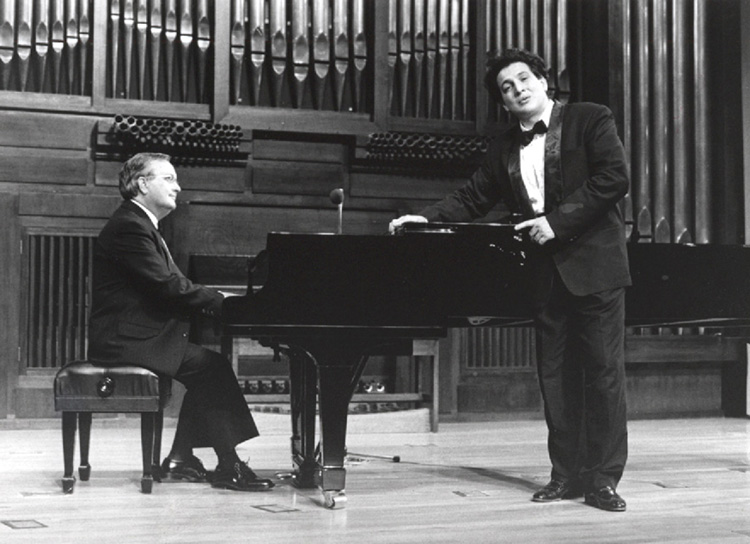Ernesto Grisales was born in Buga, Colombia (no date is to be found). At age 18, he moved to Spain so as to study voice at the conservatory in
Madrid. When he returned to Colombia for the first time as a singer in 1994 (Alfredo at the Teatro Colón in Bogotá), the press
reported that he already looked back on a stage experience of 15 years, so he must have made his debut in 1979.
A large part of his career took place at small and medium theaters in Central Europe: Coburg, Bonn, Kassel, Halle an der Saale, Gars am Kamp
Festival, Sankt Margarethen Festival, Avenches, Pfäffikersee Festival, Sankt Gallen, Eutin Festival, Leipzig, Mannheim, Wiesbaden, Darmstadt,
Como, Graz, Klagenfurt, Bratislava (a whole lot!); but he also sang elsewhere in similar theaters, Bergen (Norway), Oslo, Stockholm, Gijón,
Pisa, Lucca, Palma de Mallorca, Toulouse, Reims, Pafos, Athens, Timişoara, Tirana, Palm Beach, Lima, Toronto, Montréal, Seoul...
However, he also appeared at some prominent venues: Arena di Verona (as Radamès), Torre del Lago Festival, Teatro dell'Opera in Rome (Alfredo),
Staatsoper Berlin (Pinkerton), Marseille (Pollione, Paco in La vida breve), São Paulo (Calaf), Venice (Puccini's des Grieux),
Palermo, Teatre del Liceu in Barcelona.
In my very distant past as an opera critic, I heard Grisales as Duca di Mantova in Innsbruck (1989); 35 years later, I still remember him quite
fondly, which is a good sign. Here's what I wrote in my review back then: "Ernesto Grisales is a noble, rather small-voiced tenor who unfortunately
deploys his beautiful piano too rarely." And after chiding the amateurish conductor of the performance, I added: "Mr. Grisales saved some scenes
thanks to his experience." (Wiener Journal, May 1989)
So his Duca at the tiny Landestheater in Innsbruck seemed "rather small-voiced"... how he ever arrived at singing Radamès (his most performed role
in later years), Otello, Pollione, Alvaro, Manrico and so forth always was and still is completely beyond me. And actually, I found a lot of
unfavorable newspaper reviews of his efforts in dramatic roles. About his November 2011 Radamès in Pisa, www.opera-britannia.com wrote
(the review is no longer online): "Since he had already screamed his way through the role of Canio in Pagliacci last month, I didn't have high
expectations about Ernesto Grisales. As Radamès he was simply unacceptable. The first notes of 'Se quel guerrier io fossi' anticipated that with
his guttural and bottled vocal production the tenor would not be able to do anything else but belt out loud, graceless sounds, flat more often
than not."
Reference 1: El Tiempo, 19 and 23 July 1994; reference 2: Semana, 30 July 1994; reference 3; reference 4; reference 5; reference 6; reference 7: La
Nueva España, 6 December 2010; reference 8; reference 9; reference 10; reference 11; reference 12: Opera Bergen, Aida program, August 2005
Picture source
